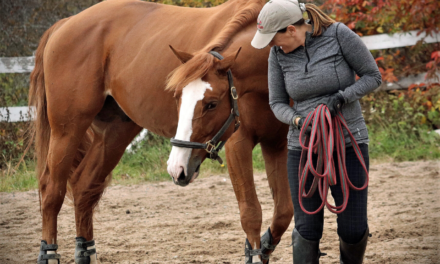We may earn money or products from the companies mentioned in this post. For more information please check out our disclosure page
About Ulcers
Ulcers generally develop in the stomach but can also develop in the colon. Although stomach ulcers are known as Equine Gastric Ulcer Syndrome (EGUS), a horse can develop two types of ulcers.



Equine Glandular Gastric Ulcer Syndrome (EGGUS). This is a rare form of ulcer found in the lower part of the horse’s stomach although it is more common in racehorses.
Equine Squamous Gastric Ulcer Syndrome (ESGUS). These ulcers are found in the upper part of the stomach and are far more common with 60-80 percent of horses diagnosed with this kind of ulcer.
Stomach ulcers can also lead to hindgut (or colonic) ulcers which are harder to diagnose. Quite often veterinarians usually suggest treating for them as a precaution.
Symptoms
Regardless of the type of ulcer the symptoms are the same and include:
• Teeth grinding
• Cribbing/weaving
• Repeated mild colic episodes
• Dull coat
• Decreased appetite
• Girthy, irritable around flank area
• Diarrhea
• Weight loss
• Lack of energy
• Decreased performance
• Reluctance to move forward off the leg, collect, or bend around the leg
• General behavior/attitude change
Diagnosis
Consult your vet if you suspect your horse may be suffering from ulcers.
• They may suggest a treatment plan based on the horses’ symptoms or behavior,
• They may make an emergency visit based the seriousness of the symptoms, such as colic, in order to make the horse more comfortable.
• They may suggest doing an endoscopy or gastroscopy to give an official diagnosis.
Treatment
Treatment will be based on whether your horse had EGGUS or ESGUS ulcers and should include immediate short term treatment alongside a long term treatment.
Both types of ulcers would be treated with:
• Omeprazole – This can be prescribed at different dosages depending on how large an omeprazole dose the horse needs. It works by suppressing the production of acid in the stomach
• Digestive Supplements – to provide support to the horse’s digestive system promoting proper gut function
• Mucosal Protectant – to increase mucus concentration
When treating ESGUS ulcers In addition to the above your veterinarian may advise the use of the following:
• H2 Blocker – this prevents histamine from stimulating the horse’s stomach to create more gastric acid
• Antacids – such as Maalox which help decrease the pH of acid in the stomach
Prevention is going to be your best friend! Read our blog on “How To Prevent Ulcers”
Seek the advice of a qualified veterinarian before proceeding with any diagnosis, treatment, or therapy.
This post may contain affiliate links. Please read our disclosure for more info.
admin
Latest posts by admin (see all)
- A Horse For All Reasons – Guest Blog by Lucy from Horse Factbook - April 8, 2020
- How To Deal With A Spooky Horse Trail Riding - March 31, 2020
- Our Top 20 Amazon Equestrian Products - January 30, 2020







